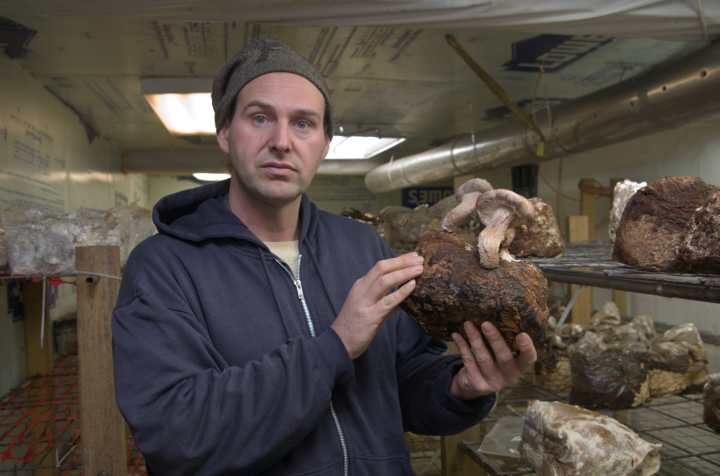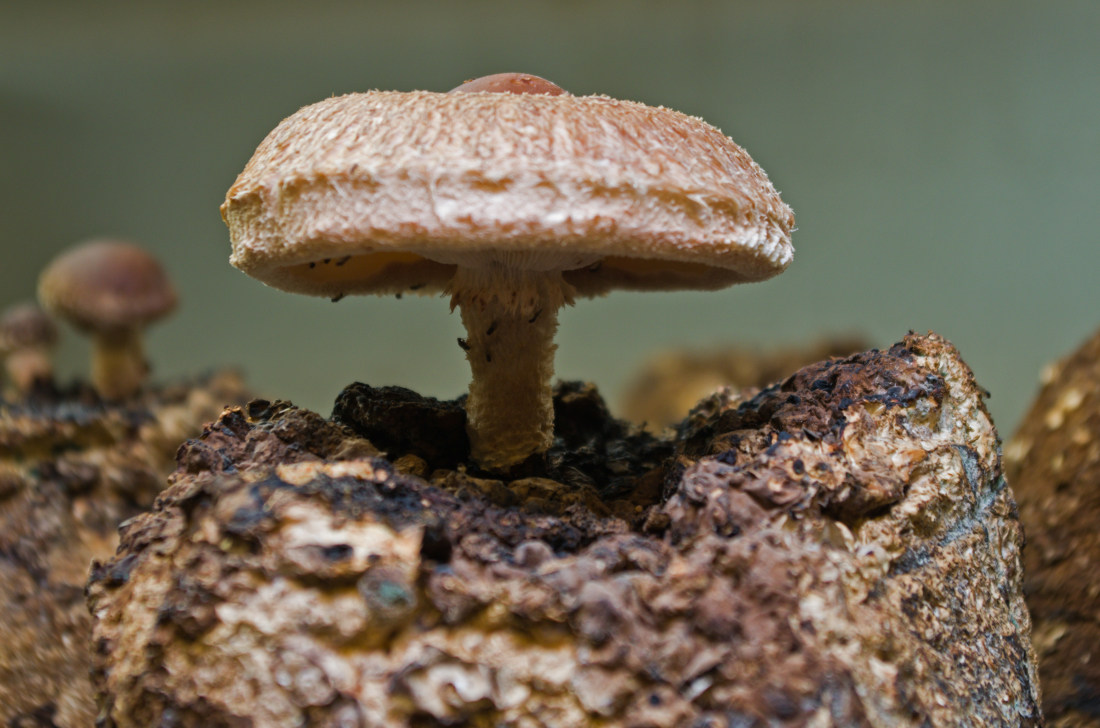Drive through any Asheville neighborhood in the warmer seasons and you’ll spot a handful of gardens. Tomato vines creep up metal cages while wide squash and zucchini leaves clap hands in the breeze, carrots peeking up from their shadows. In recent years, raising one’s own food has gone from a growing trend to a regular hobby to a staple of life.
The American Gardening Association calculates that roughly one in five homes has a garden, which requires a little under five hours a week on average to maintain and saves a lot of money on grocery runs. With so much of our food coming from our yards instead of the grocery store, it begs the question: What else can we grow ourselves?
“Growing mushrooms at home is extremely rewarding,” says Tyler De Francisco, a hog and sheep farmer and owner of Sugar Creek Meats in Leicester. He also keeps around 200 mushroom-growing logs on his property just for fun. “The quality is phenomenal, compared to anything that you can buy in the store.”
For the farmer, the addition of mushrooms to his property was an easy decision. “With shiitakes, it’s a little bit of work for a lot of mushrooms over a little bit of time.”
Some species are easier to grow than others. Oyster, shiitake and lion’s mane are fairly simple, slutty little ‘shrooms that will propagate, reproduce and grow at the drop of a hat. Maitake, hen of the woods and other more complex species can be significantly more difficult to grow.
“I do a lot of wild harvesting, and I love wild mushrooms,” says Chris Parker, the proprietor of Mushroom Central, a store that sells aspiring mushroom growers all they need to farm their own fungus. “However,” he notes, “my first introduction to mushrooms was plugging shiitakes when I was 15 in an introduction to agriculture and natural resources class at East Rutherford High in Rutherford County. In a way, I did it all backwards. I started plugging logs, and then I got into how you produce every original aspect of a mushroom.”
Parker opened his small West Asheville shop in December 2012. There he clones wild mushrooms in his lab. “We started this shop to provide cultures all the way down from colonized petri dishes to fresh mushrooms and everything in between — grain spawn, sawdust spawn, plug spawn, you name it,” he explains. “Even micrological supplies for people who want to do the sterile work themselves.”
Businesses like Parker’s allow farmers and hobbyists alike the tools needed to supplement their incomes by plugging logs (inserting mushroom spores into drilled holes in specially selected logs) and letting a crop grow, for the most part, on its own. And Parker’s business is growing like the fungus he supplies — this spring he plans to move his operation to a new, more spacious facility in a large complex of greenhouses being renovated on Cowan Cove Road in West Asheville.
“It all starts with a petri plate like this” Parker explains, holding up a covered and taped-shut dish with a long, sprawling web of white fungus. “This is completely colonized with mushroom mycelium. Once it is fully colonized like that, you would take a few wedges of this auger and drop it into this sterilized grain.” He holds up a jar of grain, bright white patches spread through the gaps between the granules. He holds up a jar of grain, bright white patches spread through the gaps between each granule.

There’s a real risk at this stage. It’s easy for an environment that cultivates a fungus to also cultivate a disgusting bacteria, which can compromise the entire pillow-sized bag of product. But a clean bag allows the grain to form into a barklike texture, from which sprouts rapidly growing mushrooms.
“You’ll see these little things that look like popcorn popping,” he says pointing inside the bag. “When those occur, it’s time to open the bag and just let the mushrooms grow and pollinate.” From the lab stages, the budding bags are transferred to the grow room downstairs, where a budding mushroom can begin to grow within anywhere from a week to three weeks, depending on the species. From the 300-square-foot room, “at the height of production, you can crank out 40 pounds of mushrooms a week,” Parker explains. This spring, Parker plans on moving to a new facility in a complex of greenhouses being renovated on Cowan Cove Road in West Asheville. The new space will allot him 1,200 square feet with 17-foot ceilings.
Parker says a guest recently visited Mushroom Central with a collection of shiitake mushrooms he had harvested from his garden. “I asked him if he had a bunch of logs, and he said no,” Parker recalls. “They were just fruiting off of the side of his raised garden bed.” So Parker cloned the mushrooms. One of the keys to growing strong, healthy mushrooms is to breed them from the most adaptable and sturdy source. “Whenever you’re cloning a mushroom from the wild, you never know what you’re going to get.” Conceivably, those shiitakes shouldn’t have been growing from a railroad tie without bark, but the mycelium had adapted and grown wherever it could.
“I’ll take the ones that survive under the worst conditions and use those as my breeding stock. You select for the strongest ones. A lot of plants you buy at bigbox stores are just barely being kept alive, and they are hoping to get it out the door before it really starts to go downhill. So I’m all about breeding for genetics, and that’s why I’m always trying to find and pick up new strains of mushrooms in the wild. It just makes for a deeper, broader library to pull from.”
De Francisco came into mushroom growing a different way: He attended a program run by the Madison County Cooperative Extension office. “They are really big on shiitake production and promotion in Madison County,” he says. “Our altitude, the way the mountains are formed, the temperature swings in this area are just perfect for shiitake mushrooms.
“They gave me pounds and pounds of the spawn,” he continues, “and sent me to a workshop to learn how to grow them. I read up on it and it became apparent that I wasn’t going to have anything within the first year.” But after laying his logs across a stream on his farm, he says he saw mushrooms in under six months.
“A shaded spot is best,” he explains. “Sunlight is really going to affect these logs in a negative manner, it’s going to affect the fruiting of the mushroom, and it will dry out the log.” For those with no stream or a water source, De Francisco suggests buying a trough or tub, depending on the size of the log, to immerse logs in water for 24-48 hours, a process called shocking, before returning them to their shady spot to fruit.
Everything can affect the yield of the mushroom, from temperature swings to humidity to dry spells. But with over 200 logs inoculated now, he says, “I’ve seen flushes that were anywhere from 50-150 pounds.”
To learn more about growing your own mushrooms, call and set up an appointment with Mushroom Central at 301-0395. To learn more about Madison County Cooperative Extension programs, call 649-2411 or visit madison.ces.ncsu.edu.



Before you comment
The comments section is here to provide a platform for civil dialogue on the issues we face together as a local community. Xpress is committed to offering this platform for all voices, but when the tone of the discussion gets nasty or strays off topic, we believe many people choose not to participate. Xpress editors are determined to moderate comments to ensure a constructive interchange is maintained. All comments judged not to be in keeping with the spirit of civil discourse will be removed and repeat violators will be banned. See here for our terms of service. Thank you for being part of this effort to promote respectful discussion.